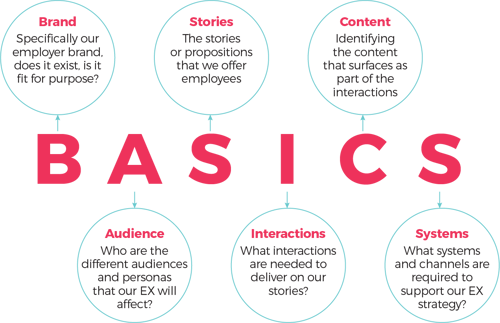How to write an Employee Experience strategy
Once you’ve selected your core Employee Experience (EX) team – involving representatives from across the organisation - and have undertaken an EX Audit, the next step is the EX strategy.
It’s important to have a clear definition of what you are trying to achieve, so the EX team should define the EX strategy—or review the strategy if one already exists.
Working on the EX strategy will also help to get the team on the same page by providing a forum to discuss the different views and priorities of the group and agree a united approach to move forward with.
As we have said many times, we see EX and CX as two sides of the same coin and therefore it will come as no surprise that the methodology we suggest for the EX strategy is the same one we use for CX strategy—we call it BASICS—and it goes like this:

We recommend workshopping these elements and having three workshops as follows:
- Workshop 1—Brand and Audiences
- Workshop 2—Stories and Interactions
- Workshop 3—Content and Systems
Your published EX strategy should include a high-level roadmap showing key objectives, milestones, and deliverables. During the implementation phase, activities that align with the strategy should take priority and the EX strategy can often be a useful tool to help resolve any conflicts that arise along the way.
As each EX strategy will be unique, it’s futile giving you an example of one here. We certainly don’t advocate a ‘boilerplate’ approach and think you should be wary of anyone who does!
If you would like to understand more about developing an EX Strategy, then do get in touch.
For more on Employee Experience strategies, view this page.


